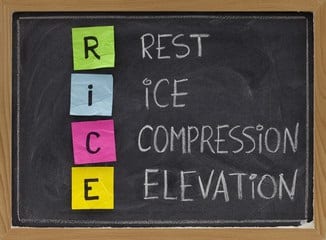- Rest. Rest and protect the injured or sore area. Stop, change, or take a break from any activity that may be causing your pain or soreness.
- Ice. Cold will reduce pain and swelling. Apply an ice or cold pack right away to prevent or minimize swelling. Apply the ice or cold pack for 10 to 20 minutes, 3 or more times a day. After 48 to 72 hours, if swelling is gone, apply heat to the area that hurts. Do not apply ice or heat directly to the skin. Place a towel over the cold or heat pack before applying it to the skin.
- Compression. Compression, or wrapping the injured or sore area with an elastic bandage (such as an Ace wrap), will help decrease swelling. Don’t wrap it too tightly, because this can cause more swelling below the affected area. Loosen the bandage if it gets too tight. Signs that the bandage is too tight include numbness, tingling, increased pain, coolness, or swelling in the area below the bandage. Talk to your doctor if you think you need to use a wrap for longer than 48 to 72 hours; a more serious problem may be present.
- Elevation. Elevate the injured or sore area on pillows while applying ice and anytime you are sitting or lying down. Try to keep the area at or above the level of your heart to help minimize swelling.
Nonsteroidal anti-inflammatory drugs (NSAIDs) may also help relieve your pain and swelling. They include:
Be safe with medicines. Read and follow all instructions on the label.
When your soreness and pain are gone, begin stretching and strengthening exercises slowly, then gradually increase these exercises.


